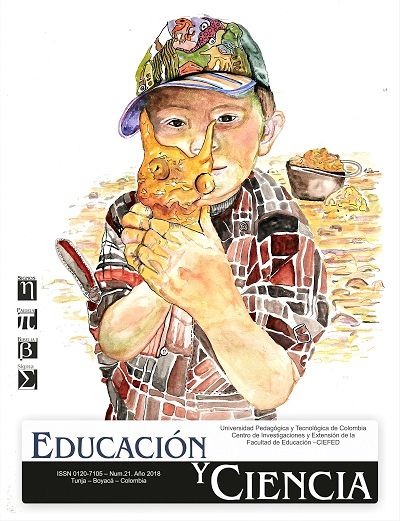Ethics as an art of living: reflections at “Galileo Galilei” educational institution

Abstract
Ethics as an art of living arises from Foucault’s studies related to self-care, which openly confronts power centred on the organization of individuals
under certain norms, considering that subjects can shape themselves in opposition to the subjection or attempt to form a defined identity. Dialogued
reflections are presented with teachers of the “Galileo Galilei” Educational Institution (Tunja, Colombia) together with the analysis of practices and
discourses, to recognize the elements of ethical constitution under this perspective. It is a qualitative research of interpretive approach, which highlights
meeting points such as freedom, selfgovernment and democracy among others, and some divergences such as conformist thinking and monitoring of
meaningless norms.
Keywords
ethics, moral values, social values, self-discipline, self-respect.
References
Camps, V. (2014). Breve historia de la ética. Barcelona: RBA Libros, S.A.
Cañizalez Mesa, N. E., & Pulido Cortés, O. (2015). Editorial. Educación Y Territorio,
5(9), 9-14. Recuperado a partir de https://www.jdc.edu.co/revistas/index.php/
reyte/article/view/91
Castillo, L. (2004). Tema 5. Análisis documental. Biblioteconomía. Recuperado de
http://www.uv.es/macas/T5.pdf
Florián, V. (2006). La ética del cuidado de sí. Moral y ética de Foucault. Franciscanum.
Bogotá. Recuperado de http://www.redalyc.org/pdf/3435/343529895005.pdf
Foucault, M. (1999). Estética, Ética y Hermenéutica . Barcelona: Paidós.
García Ramírez, N., & Martínez Pérez, L. (2015). Incidencia del abordaje de una cuestión
socio-científica en la alfabetización científica y tecnológica de jóvenes y adultos.
Praxis & Saber, 6(11), 87 - 114. https://doi.org/10.19053/22160159.3576
Gimnasio Galileo Galilei. (2015a). Proyecto Educativo Institucional. Tunja: Gimnasio
Galileo Galilei.
Gimnasio Galileo Galilei. (2015). Manual de convivencia. Tunja: Gimnasio Galileo
Galilei.
González, J (1999). El paradigma interpretativo en la investigación social y educativa.
España. Recuperado en: http://institucional.us.es/revistas/cuestiones/15/
art_16.pdf
Hadot, P. (2006). Ejercicios espirituales y filosofía antigua. Madrid: Siruela.
Hernández, R., Fernández, C., & Baptista, P. (2010). Metodología de la investigación.
México: McGraw-Hill.
Lozano, L. (2012). La Cuestión Ética en Foucault. Revista Amauta, 20, 83-89.
Mill, J. (2015, agosto 08). Por el pan y por las rosas. Recuperado de http://
porelpanyporlasrosas.weebly.com/uploads/1/1/8/1/11810035/john_stuart_
mill_-_el_sometimiento_de_la_mujer.pdf
Ministerio de Educación Nacional de Colombia. (1998). Educación ética y valores
humanos. Bogotá: Magisterio.
Rawls, J. (2006). Teoría de la Justicia. Cambridge, Mass: The Belknap Press of
Harvard University Press.